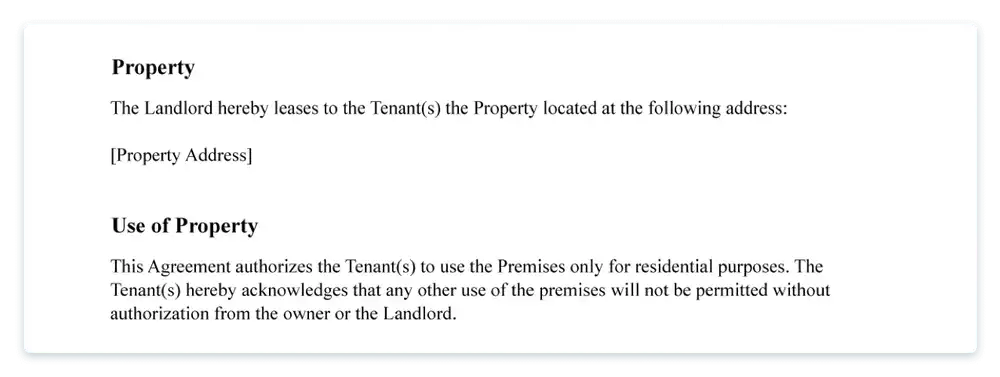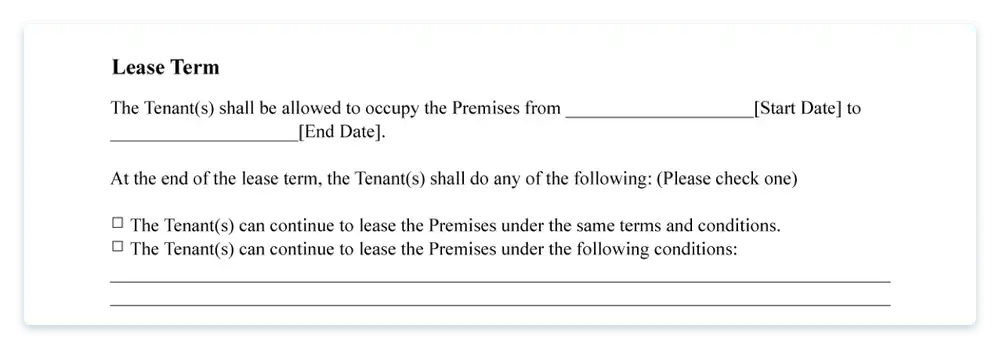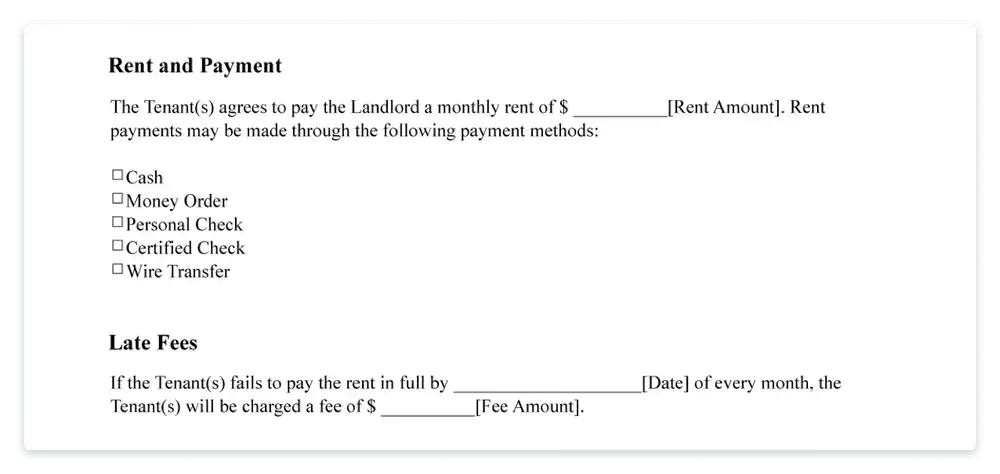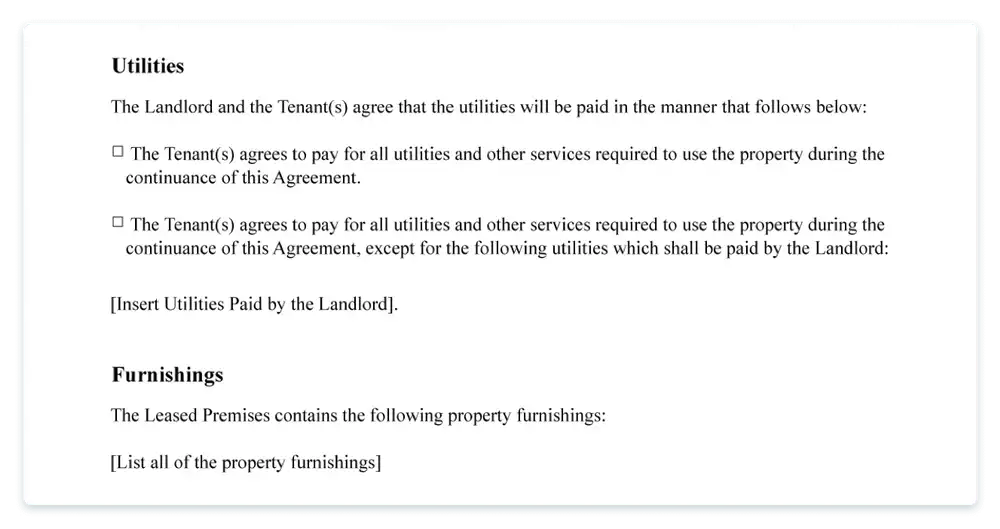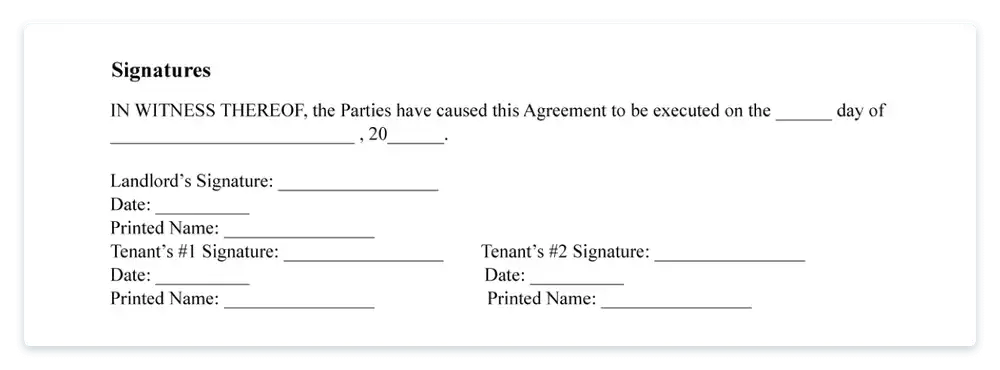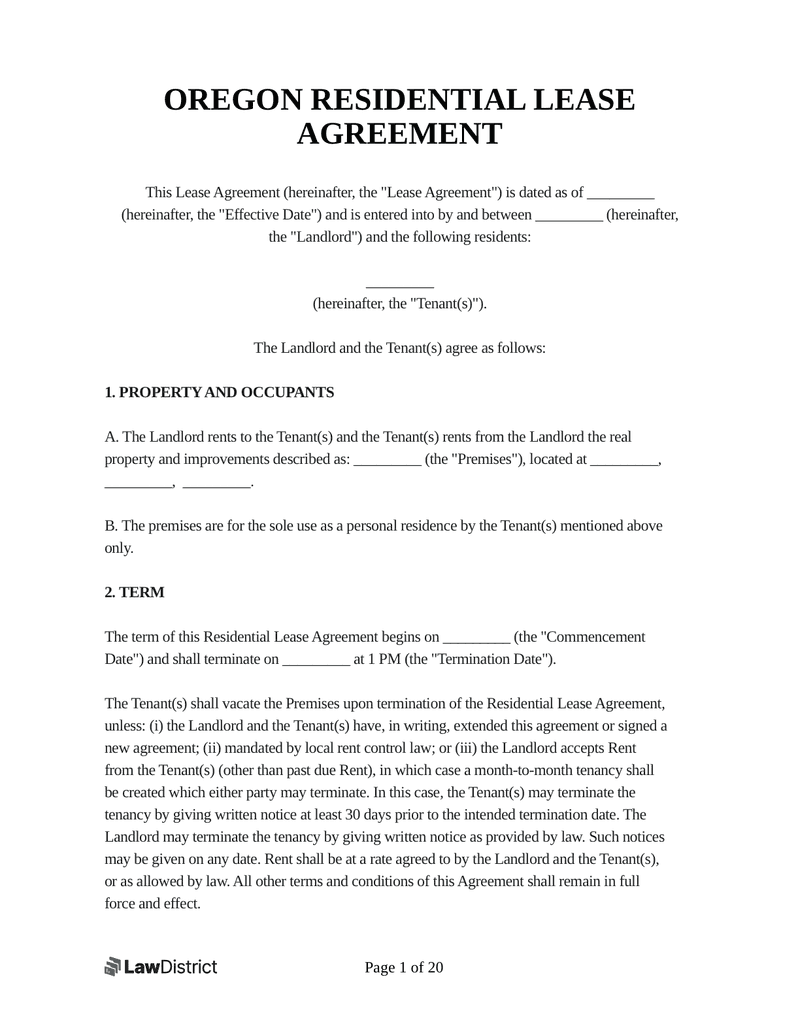RESIDENTIAL LEASE AGREEMENT
THIS LEASE AGREEMENT (hereinafter, the "Lease Agreement") is dated as of ________ day of ________________, ________ (hereinafter, the "Effective Date") and is entered into by and between the following parties:
_________
(hereinafter the "Landlord")
- AND _________
(hereinafter the "Tenant(s)")
The Landlord and the Tenant(s) agree as follows:
1. The Landlord rents to the Tenant(s) and the Tenant(s) rents to the Landlord a house, located at _________ (hereinafter the "Property"), for the sole use as a personal residence.
2. Subject to the provisions of this Agreement, only the Tenant(s) mentioned in this Lease Agreement will be permitted to live on the Property. No other person will be allowed to live on the Property without the prior written consent of the Landlord.
PETS
No animal or pet shall be kept, permanently or temporarily, on or about the Property, even temporarily or with a visiting guest. As provided by law, a Service Animal(s) is not considered a pet, and every individual with a disability shall have a right to have a Service Animal(s) on the Property.
PARKING
Parking spaces for motor vehicles or motorcycles are not provided nor permitted on the Property under this Lease Agreement.
SMOKING
Smoking is not allowed in or on any area of the Property, including individual units and common areas, both indoors and outdoors. This policy applies to all owners, tenants, or guests.
If the Tenant(s) contravenes this provision by smoking or allowing guests to smoke in any place on the property, then such Tenant(s) shall be held liable for any damages caused to the Property. The violation of this provision shall be considered a just cause for the eviction of the Tenant(s) by the Landlord.
VAPING
Vaping is not allowed in or on any area of the Property, including individual units and common areas, both indoors and outdoors.
3. The term of the Lease Agreement begins on _________ (hereinafter, the "Commencement Date") and shall terminate on _________ (hereinafter, the "Termination Date").
4. The Parties must comply with the law of the State of Oregon in any notification to end this tenancy.
5. The Tenant(s) shall pay the Landlord Rent in the amount of $_________ per week (hereinafter, the "Rent").
6. The Tenant(s) shall pay the Landlord Rent weekly prior to or on _________ day of every week during the term of this Lease Agreement at _________ or at such other place as the Landlord may designate later by:
7. The Landlord may increase the Rent that will be paid for the Property by providing to the Tenant(s) such notice as required by Oregon Law.
8. The Parties will inspect the property to evaluate its condition at the beginning and the end of the lease term.
9. The Tenant(s) shall not unreasonably withhold consent to the Landlord to enter the Property to inspect the premises, make necessary repairs, or exhibit the Property to prospective or actual purchasers, mortgagees, or tenants.
The Landlord shall not abuse the right of access or use such right to harass the Tenant(s). Except in case of an emergency, the Landlord shall give the Tenant(s) at least twenty-four (24) hour notice to enter the Property and may enter only at reasonable times. Further, if the Landlord makes an emergency entry while the Tenant(s) is not at home, the Landlord must notify the Tenant(s) within 24 hours what the emergency was, when it happened and the names of the people who entered the Property.
10. The Tenant(s) shall not make any sort of improvements on the leased Property without the Landlord's prior written consent. All improvements made by the Tenant(s) shall become the Landlord's property and shall be surrendered with the leased premises at the termination of this Lease Agreement unless the Tenant(s) obtain written consent from the Landlord before doing any of the following:
(a) Additions
(b) Alterations
(c) Fixtures
(d) Redecorations
(e) Installing a waterbed(s).
11. The Tenant(s) shall be responsible for and shall pay for all utilities and services used or consumed at the Property.
12. The Tenant(s) shall not pay for any insurance to protect property belonging to such Tenant(s). However, if the property belonging to the Tenant(s) suffers any damage or loss, the Landlord will not be liable for any property that suffers any damage or loss.
13. The Tenant(s) will not be held responsible for insuring the Landlord's property in or about the premises. Further, the Tenant(s) will not be liable for either damage or loss of such property.
14. In any lawsuit brought to enforce the Lease or under applicable law, the party in whose favor a judgment or decree has been rendered may recover reasonable court costs, including attorneys' fees, from the non-prevailing party.
15. This Lease Agreement shall be governed, construed, and interpreted by the State of Oregon.
16. If any term or provision of this Lease Agreement is held invalid or unenforceable for any reason, the remaining provisions shall not be affected by such provision and will continue to be valid and enforceable.
17. If a court holds that any provision of this Lease Agreement is invalid or unenforceable and such provision is eliminated, the remaining provisions shall continue to have full effect.
ENTIRE AGREEMENT AND AMENDMENT OF THE LEASE
18. This Lease Agreement contains the entire agreement of the parties and there are no other promises, conditions, understandings, or other agreements, whether oral or written, relating to the subject matter of this Lease. This Lease Agreement may be modified or amended in writing if it is signed by both parties.
ASSIGNMENT AND SUBLETTING
19. The Tenant(s) shall not, without the prior written consent of the Landlord, assign this Lease Agreement or any interest herein or sublet the Property or any part thereof.
20. All damages done to the property shall be charged to the Tenant(s) and may be considered cause for the termination of this lease agreement.
21. The Tenant(s) shall occupy and use the Property exclusively as a residential dwelling unit. No other uses shall be allowed to the Tenant(s) other than for residential dwelling purposes, except as may be allowed by the written consent of the Landlord and if and only if the alternative use is allowed under all applicable zoning laws. In such case, the Tenant(s) shall obtain liability insurance to cover any risks associated with alternate use of the property.
Further, the Parties must comply with all health, fire, and safety regulations. Any material breach of this provision by the Tenant(s) constitutes valid grounds for eviction or lease termination.
22. The Tenant(s) accepts the Property in its present condition and state of repair and shall be given possession of the Property on the day of commencement of this Lease Agreement.
At the expiration of the lease term, the Tenant(s) shall leave and surrender the Property in as good a state and condition as they were in at the commencement of the lease term, reasonable use, wear and tear, and damages by the elements excepted.
23. The Tenant(s) may be reached for any matter related to this tenancy at the Property or through the following phone number and email:
(a) Name: _________
(b) Phone: _________
(c) Email: _________
24. The Landlord may be reached for any matter related to this tenancy at the Property or through the following phone number and email:
(a) Name: _________.
(b) Address: _________.
The contact information for the Landlord is:
(c) Phone: _________.
(d) Email address: _________.
25. All monetary amounts stated or referred to on this Lease are based in the United States dollar.
26. Any waiver by the Landlord of any failure by the Tenant to perform or observe the provisions of this Lease will not operate as a waiver of the Landlord's rights under this Lease in respect of any subsequent defaults, breaches, or non-performance and will not defeat or affect in any way the Landlord's rights in respect of any subsequent default or breach.
27. This Lease will extend to and be binding upon and inure to the benefit of the respective heirs, executors, administrators, successors and assigns, as the case may be, of each Party. All covenants are to be construed as conditions of this Lease.
28. All sums payable by the Tenant to the Landlord pursuant to any provision of this Lease will be deemed to be additional rent and will be recovered by the Landlord as rental arrears.
29. Where there is more than one Tenant executing this Lease, all Tenants are jointly and severally liable for each other's acts, omissions, and liabilities pursuant to this Lease.
30. Locks may not be added or changed without the prior written agreement of both Parties, or unless the changes are made in compliance with the Act.
31. The Tenant will be charged an additional amount of $_________ for each N.S.F. check or checks returned by the Tenant's financial institution.
32. Headings are inserted for the convenience of the Parties only and are not to be considered when interpreting this Lease. Words in the singular mean and include the plural and vice versa. Words in the masculine mean and include the feminine and vice versa.
33. This Lease may be executed in counterparts. Facsimile signatures are binding and are considered to be original signatures.
34. Time is of the essence in this Lease.
IN WITNESS WHEREOF _________, _________ have duly affixed their signatures on this________day of ________________, ________.
________________________________
Landlord: _________
_________________________________
Tenant: _________
The Tenant acknowledges receiving a duplicate copy of this Lease signed by the Tenant and the Landlord on the________day of ________________, ________.
_________________________________
Tenant: _________

